Artificial Intelligence and Jobs: Top Careers AI Is Creating and Transforming
What is Artificial Intelligence?
Artificial Intelligence (AI) refers to the development of computer systems capable of performing tasks that typically require human intelligence. These tasks include problem-solving, learning, language understanding, visual perception, and decision-making. AI systems can simulate human cognitive processes and improve their performance over time as they are exposed to more data.
AI is built upon several foundational technologies. The most prominent of these include Machine Learning (ML) and Deep Learning (DL). Machine learning enables systems to learn from data and make predictions or decisions without being explicitly programmed. Deep learning, a subset of ML, uses artificial neural networks inspired by the human brain to process large amounts of data and uncover patterns that would be difficult for traditional algorithms to detect. These technologies allow AI systems to continuously evolve and become more accurate in their outputs.
AI’s Ability to Automate and Decide
One of AI's most powerful capabilities is its ability to automate repetitive and time-consuming tasks. For example, AI can streamline customer service through chatbots, optimize supply chains, and process massive datasets in minutes. Beyond automation, AI also supports decision-making processes by analysing complex data, forecasting trends, and offering actionable insights. This helps organizations become more efficient and make informed, data-driven decisions.
Role of AI in Various Industries
AI is transforming nearly every sector. In healthcare, it aids in diagnostics and patient care; in finance, it powers fraud detection and algorithmic trading. Retail uses AI for personalized shopping experiences, while manufacturing relies on it for predictive maintenance and quality control. As AI continues to advance, it is significantly influencing how industries operate and evolve, leading to new opportunities and reshaping existing roles. This evolution underscores the growing connection between artificial intelligence and jobs, as the workforce adapts to an increasingly AI-driven world.
What is the Impact of AI on the Job Market?
Artificial Intelligence (AI) is profoundly changing the employment landscape, reshaping job roles, creating new career paths, and transforming how we work. As AI technologies continue to evolve, they are influencing both traditional and emerging industries in unprecedented ways.
Reshaping Traditional Job Roles
AI is automating repetitive and manual tasks across sectors such as manufacturing, customer service, and logistics. Jobs that once required significant human effort are now being handled by intelligent systems, which increases efficiency and reduces costs. For example, warehouse operations are increasingly managed by robots, while customer queries are handled by AI chatbots. This shift is prompting workers to acquire new skills to remain competitive in the job market.
Rise of AI-Related Job Opportunities
While some roles are being phased out, AI is also creating a wealth of new opportunities. There's a growing demand for professionals with expertise in data science, machine learning, and AI system development. Roles such as AI engineers, machine learning specialists, data analysts, and ethical AI officers are rapidly emerging across industries. These careers often require a mix of technical skills, critical thinking, and creativity, making them attractive to both new graduates and experienced professionals looking to pivot.
Transformation of Existing Jobs
Rather than completely replacing workers, AI is also enhancing many existing roles. In fields like healthcare, AI tools assist doctors in diagnostics and treatment planning. In marketing, AI algorithms personalize customer experiences and analyse campaign performance. These transformations are allowing professionals to focus on more strategic and value-driven tasks.
As businesses adapt, the relationship between artificial intelligence and jobs becomes more complex, involving both disruption and innovation. Understanding this balance is key to preparing for the future of work in an AI-integrated economy.
What Types of Jobs Involve Artificial Intelligence?
As artificial intelligence continues to evolve, it is creating a wide range of career opportunities across various industries. These roles span technical, research, managerial, and business-focused areas, offering professionals from diverse backgrounds a chance to contribute to AI innovation and implementation.
AI and Machine Learning Engineers
AI and machine learning engineers are at the core of AI development. They design, build, and train algorithms that allow machines to learn from data. These professionals work on projects such as natural language processing, computer vision, and predictive analytics. Strong programming skills and a deep understanding of mathematical models are essential in this field.
Data Scientists and Analysts
Data scientists and analysts play a critical role in transforming raw data into actionable insights. They clean, process, and analyse large datasets using statistical methods and machine learning tools. Their work supports strategic decision-making and helps AI systems become more intelligent and accurate over time.
AI Researchers and Specialists
AI researchers focus on advancing the theoretical and practical aspects of artificial intelligence. They explore new algorithms, improve model efficiency, and publish findings that shape the future of AI. AI specialists, on the other hand, apply existing AI solutions to real-world problems, ensuring they are practical, ethical, and scalable.
Robotics Engineers
Robotics engineers design and build robots that interact with the physical world. These robots often incorporate AI technologies to perform tasks autonomously, such as warehouse automation or surgical assistance. This role requires expertise in hardware, programming, and control systems.
AI Product Managers
AI product managers bridge the gap between technical teams and business goals. They define product requirements, guide development, and ensure AI solutions meet user needs. A strong understanding of both technology and market trends is essential for this role.
Sales and Marketing Roles
Companies also need professionals who can sell and market AI-driven solutions. These roles involve explaining complex technologies to clients, crafting value propositions, and driving adoption.
How is AI Creating New Career Opportunities?
Artificial Intelligence is not only transforming how we work but also expanding the range of career options available to professionals across both technical and non-technical fields. As AI adoption grows, so does the demand for new roles that address its development, deployment, and ethical use.
Emerging Roles in AI
New career paths are emerging in response to the unique challenges and responsibilities that come with AI technologies. AI ethics officers are becoming essential for organizations to ensure that AI systems are fair, transparent, and unbiased. AI trainers help machine learning models improve by curating and labelling training data. Meanwhile, AI explain ability experts work to make complex AI decisions understandable to users and stakeholders, improving trust and accountability in automated systems.
Demand for Domain Experts
AI is increasingly applied in industry-specific contexts, creating opportunities for professionals with domain knowledge to collaborate with AI teams. For example, healthcare professionals who understand AI can help design diagnostic tools or patient care solutions. Similarly, finance experts are needed to integrate AI into areas like fraud detection, risk assessment, and automated trading. These roles require a combination of industry experience and an understanding of how AI technologies can be ethically and effectively applied.
AI Careers in Non-Technical Fields
AI is not just for coders and data scientists. There are growing opportunities in business and management roles as well. AI consultants help companies identify how to leverage AI for strategic advantage. Project managers with AI literacy oversee AI implementation, ensuring goals are met on time and within scope. Even marketing, human resources, and education are fields where knowledge of AI can enhance traditional roles.
How is AI Transforming Existing Jobs?
Artificial Intelligence is not just creating new roles—it’s also revolutionizing existing jobs across various industries. By automating routine tasks, supporting complex decision-making, and enhancing overall productivity, AI is reshaping how professionals perform their daily work.
Enhancing Job Functions through Automation
AI is increasingly being used to automate repetitive and time-consuming tasks. In administrative roles, for instance, AI can schedule appointments, manage emails, and process documents. This allows employees to focus more on strategic and creative responsibilities. In finance, automation handles routine bookkeeping and data entry, freeing analysts to concentrate on deeper financial insights.
Decision Support and Productivity Gains
One of AI’s most powerful contributions is its ability to support human decision-making. AI systems can analyse large volumes of data quickly, identify patterns, and suggest actionable recommendations. This is especially valuable in fields like marketing, where AI can guide campaign strategies, or in logistics, where it helps optimize supply chain management. The result is improved accuracy, faster workflows, and increased productivity across departments.
Real-World Examples of AI Integration
In healthcare, AI assists doctors by analysing medical images, predicting patient outcomes, and personalizing treatment plans. In customer service, AI chatbots handle basic inquiries, enabling human agents to deal with more complex issues. In manufacturing, predictive maintenance systems use AI to monitor equipment and prevent costly breakdowns. These integrations not only make jobs easier but also elevate the role of the human worker to focus on oversight, interpretation, and high-level decision-making.
The ongoing evolution of jobs involving AI highlights how technology is not replacing workers but empowering them to do more, faster and better. As AI becomes more embedded in the workplace, employees who adapt and develop complementary skills will thrive in the changing job landscape.
What Skills are Needed for AI Careers?
Pursuing a career in Artificial Intelligence requires a blend of technical knowledge and essential soft skills. Whether you’re aiming to become an AI engineer, data scientist, or AI-focused project manager, developing the right skill set is key to success in this rapidly evolving field.
Essential Technical Skills
A strong foundation in programming is critical. Languages like Python, R, and Java are widely used in AI development due to their flexibility and powerful libraries. Understanding machine learning algorithms, data structures, and statistics is also fundamental. Familiarity with tools and frameworks such as TensorFlow, Keras, PyTorch, and Scikit-learn will help you build and train models effectively. Additionally, experience with data science techniques, including data cleaning, visualization, and analysis, is highly valuable for many AI roles.
Important Soft Skills
While technical expertise is vital, soft skills play an equally important role. Problem-solving is essential for designing effective AI solutions. Creativity helps in developing innovative approaches to real-world challenges, while critical thinking enables you to assess the ethical implications of AI applications. Strong communication skills are also crucial, especially when translating technical concepts for non-technical stakeholders or working in interdisciplinary teams.
Recommended Courses and Certifications
There are numerous learning paths to help build your AI skillset. Platforms like Coursera, edX, and Udacity offer beginner to advanced courses in AI and machine learning. Notable programs include Google’s AI certification, IBM’s AI Engineering Professional Certificate, and Microsoft’s AI Fundamentals. These certifications can help validate your skills and improve your job prospects in AI-related fields.
Whether you're starting from scratch or upskilling, the right combination of technical and soft skills will position you well for success in careers involving jobs involving AI across various industries.
What are the Challenges and Ethical Considerations in AI Careers?
As Artificial Intelligence becomes increasingly embedded in our professional lives, it introduces not only exciting opportunities but also significant ethical and practical challenges. Understanding these complexities is essential for anyone considering or already pursuing a career in the AI field.
Ethical Dilemmas in the Workplace
AI systems can make decisions that impact individuals and society, raising important ethical concerns. One major issue is bias in algorithms, which can lead to unfair outcomes in areas like hiring, lending, and law enforcement. Professionals working with AI must ensure that the data used to train models is diverse and representative. Additionally, questions about transparency and accountability—such as who is responsible when an AI system makes a mistake—are increasingly central to discussions about responsible AI development and use.
The Role of AI in Job Displacement
AI has the potential to automate many tasks, which can lead to job displacement, particularly in roles involving repetitive or manual work. While AI also creates new career opportunities, the transition can be difficult for workers whose jobs are at risk. Professionals entering AI careers must be aware of this impact and contribute to solutions that support workforce reskilling and inclusive innovation. Ethical AI development includes designing technologies that augment human abilities rather than replace them entirely.
Preparing for an AI-Driven Future
Navigating a future shaped by AI requires continuous learning and adaptability. Ethical AI practitioners must stay updated on policy changes, emerging technologies, and societal expectations. Building careers that are not only technically sound but also ethically informed is essential in maintaining public trust and ensuring AI is used for the greater good.
How to Get Started with AI Careers?
Artificial Intelligence is reshaping industries and opening doors to a wide range of exciting and impactful careers. For those interested in entering this field, getting started can feel overwhelming—but with the right approach, it’s entirely achievable.
Steps to Explore a Career in AI
Begin by understanding what AI is and how it’s applied in real-world scenarios. Research various roles such as AI engineer, data scientist, machine learning specialist, or AI consultant to see which aligns with your interests and strengths. Next, build a foundational understanding of key topics like programming (especially Python), statistics, and basic machine learning concepts. Engaging in personal projects or contributing to open-source initiatives is a great way to apply your knowledge and build a portfolio.
Embrace Continuous Learning and Upskilling
AI is a fast-moving field, so staying updated is critical. Technologies, tools, and best practices evolve rapidly, making continuous learning essential. Whether you're just beginning or already working in a related area, regularly improving your skills in areas like deep learning, natural language processing, and AI ethics will keep you competitive. Attending webinars, reading research papers, and networking with AI professionals can also help you stay ahead.
How LAI's Online Courses Support your AI Journey?
For structured learning, LAI offers beginner-friendly, flexible online courses tailored for aspiring AI professionals. These courses cover the fundamentals of AI, machine learning, and practical applications in various industries. With expert-led instruction, hands-on projects, and industry-aligned content, LAI helps learners build confidence and competence as they prepare for jobs involving AI. Whether you’re starting from scratch or looking to deepen your expertise, LAI’s resources provide a supportive and effective path into the AI field.
Conclusion
Artificial Intelligence is playing a transformative role in career development across industries. As businesses evolve, understanding the connection between artificial intelligence and jobs becomes crucial for anyone looking to future-proof their career. From creating new roles to enhancing existing ones, AI continues to redefine how we work. Whether you're pursuing a technical path or exploring non-technical opportunities, jobs involving AI offer vast potential for growth and innovation. Now is the perfect time to embrace this shift. Start your AI journey today with LAI’s expert-led courses and resources—your first step toward building a successful, AI-powered future.








